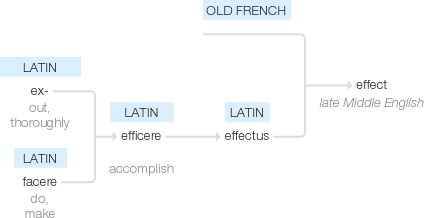Effect
late Middle English: from Old French, or from Latin effectus, from efficere ‘accomplish’, from ex- ‘out, thoroughly’ + facere ‘do, make’. effect (sense 3 of the noun), ‘personal belongings’, arose from the obsolete sense ‘something acquired on completion of an action’.
wiktionary
For noun: from Middle English effect, from Old French effect (modern French effet), from Latin effectus(“an effect, tendency, purpose”), from efficiō(“accomplish, complete, effect”); see effect as a verb. Replaced Old English fremming, fremednes from fremman.
For verb: from Middle English effecten, partly from Latin effectus, perfect passive participle of efficiō(“accomplish, complete, do, effect”), from ex(“out”) + faciō(“do, make”) (see fact and compare affect, infect) and partly from the noun effect.
etymonline
effect (n.)
mid-14c., "execution or completion (of an act)," from Old French efet (13c., Modern French effet) "result, execution, completion, ending," from Latin effectus "accomplishment, performance," from past participle stem of efficere "work out, accomplish," from assimilated form of ex "out" (see ex-) + combining form of facere "to make, to do" (from PIE root *dhe- "to set, put"). From French, borrowed into Dutch, German, Scandinavian.
From late 14c. as "power or capacity to produce an intended result; efficacy, effectiveness," and in astrology, "operation or action (of a heavenly body) on human affairs; influence." Also "that which follows from something else; a consequence, a result." From early 15c. as "intended result, purpose, object, intent." Also formerly with a sense of "reality, fact," hence in effect (late 14c.), originally "in fact, actually, really." Meaning "impression produced on the beholder" is from 1736. Sense in stage effect, sound effect, etc. first recorded 1881.
effect (v.)
"to produce as a result; to bring to a desired end," 1580s, from Latin effectus, past participle of efficere "work out, accomplish" (see effect (n.)). Related: Effecting; effection; effectible.
